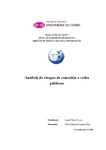Análisis de riesgos de conexión a redes públicas
Title
Análisis de riesgos de conexión a redes públicasAuthor(s)
Directors
Carneiro, VíctorDate
2022Center/Dept./Entity
Enxeñaría informática, Grao enDescription
Traballo fin de grao. Enxeñaría Informática. Curso 2021/2022Abstract
[Resumen] En este trabajo de fin de grado han estudiado y documentado las distintas categorías de ataques
que un usuario común puede sufrir al conectarse a redes públicas con el fin de comprobar
si actualmente suponen un peligro como el de hace años. Para esto, en primer lugar
se ha realizado un estudio de las tipologías de ataques que pueden darse en estas redes. Una
vez investigados los ataques, se han representado los más importantes en un entorno simulado.
Este entorno está formado por dos equipos: uno con el papel de víctima y otro con el
papel de atacante. El equipo con el papel de atacante cuenta con las herramientas de software
necesarias para llevarlos acabo. Tras las simulaciones de los ataques más importantes, se ha
realizado un análisis de riesgos de los mismos siguiendo una adaptación de la metodología
MAGERITv3 para este caso. Además, a partir de estas simulaciones y de la información reunida,
se ha elaborado una guía de buenas prácticas a la hora de conectarse a una red pública,
con posibles formas de defenderse de los ataques simulados, y también una guía de buenas
prácticas a la hora de gestionar la red. Por último, se han sacado conclusiones a partir de los
resultados obtenidos. [Abstract] In this Final Degree Project, the different categories of attacks that a normal user can
receive when connecting to a public network have been studied and documented in order to
check if they are still a danger. To achieve this goal, at first place, a study of the typologies
of attacks that can occur in this type of networks has been carried out. Once the this kind of
attacks have been investigated, the most important ones have been represented in a simulated
environment. This environment consist of two devices, one playing the role of victim and one
playing the role of attacker. The device with the role of attacker has the necessary software
tools to carry them out. After the simulations of the most important attacks, a risk analysis
is done following an adaptation of the MAGERITv3 methodology for this single project. In
addition, based on these simulations and the information gathered, a guide of best practices
when connecting to a public network has been written, including possible ways to defend
against the simulated attacks, and also a guide of best practices when administrating a public
network. Finally, conclusions have been drawn from the results obtained.
Keywords
Redes públicas
Análisis de riesgos
Ciberataques
Ciberseguridad
MAGERITv3
Análisis de riesgos
Ciberataques
Ciberseguridad
MAGERITv3
Rights
Atribución 3.0 España







